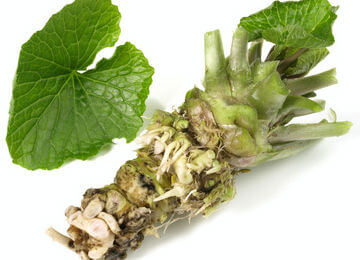Health Benefits Of Wasabi
Prevents Cancer
Regular addition of wasabi to the diet can prevent certain types of cancer. The most notable and beneficial nutrients found are the isothiocyanates. These form from glucosinolates after the plant is harvested or cut. The various isothiocyanate antioxidants are very beneficial in eliminating free radicals throughout the body’s systems. Studies have shown that one form of isothiocyanate in wasabi, 6-MITC, has been clearly shown to inhibit the expansion of leukemia and stomach cancer cells. It actually promotes apoptosis (cell death) within 24 hours of consumption. The use of wasabi may prevent the growth of tumors, even at a pre-clinical or pre-treatment size. The most attractive thing about this type of treatment is that isothiocyanates appear to kill cancer cells without damaging the healthy, surrounding cells.
Similar studies have found 6-MITC to be equally effective against breast cancer and melanoma cells, leading many researchers to support wasabi as a small preventative method against multiple types of cancer. Research regarding its strength against other kinds of cancer is still ongoing, but this powerfully flavored plant has already proven itself in the oncological community.
Only genuine wasabi has the diverse isothiocyanates that can fight a wide range of cancerous conditions. Even other plants in the Brassica family pale in comparison, particularly because they are traditionally cooked before eating, which can reduce the nutritional content, and can degrade the enzymes that lead to isothiocyanate formation. If you want to help prevent cancer through dietary change, only use real wasabi!
wasabiinfoProtects Heart Health
Another popular reason for adding wasabi more regularly to your diet is to prevent cardiovascular issues. It has anti-hypercholesterolemic properties which help in lowering high cholesterol levels in the human body, strokes and heart attacks. The isothiocyanates in wasabi do more than preventing cancer. They also have inhibitory effects on platelet aggregation. Platelet aggregation is basically the grouping together or clumping of blood platelets into a thrombus, or blood clot. These clots are the main causes of strokes and other cardiovascular crises. By breaking down and inhibiting the formation of these clots throughout the body, it effectively reduces the risk of heart disease and stroke!
Treats Arthritis
The pungent plant, wasabi, has also been shown to reduce cases of joint swelling, inflammation, and can even subdue the effects of arthritis. Again, the powerful antioxidant isothiocyanate compounds have been shown to reduce the inflammation of joints, ligaments, and muscles that may contribute to arthritis and joint pain. Studies suggest that wasabi helps in maintaining bone integrity in humans and can help in reducing the risk of osteoporosis. In the same way that isothiocyanates can reduce platelet aggregation to protect from heart disease, they also can reduce the aggregation at weak points on the body that cause pain or discomfort. Add some wasabi to your diet and feel younger!
Kills Bacteria
The powerful, natural components of wasabi have also been shown to fight off bacterial infections! In a recent study of the antibacterial properties of various foods and vegetables, wasabi ranked as the most successful antibacterial food against E. coli and Staphylococcus aureus (Staph infections). This means that food poisoning and other unfortunate conditions can be prevented by maintaining levels of isothiocyanates in the diet through the consumption of wasabi. Again, the isothiocyanates were proven to be the vital component that neutralized these potentially deadly bacteria within the body. Some companies have begun to include trace elements of wasabi extract in their antibacterial creams and gels to boost their strength and effectiveness!
Treats Respiratory Conditions
Wasabi can be a strong line of defense against certain respiratory tract pathogens. The gaseous component of wasabi, which causes such a powerful reaction in the nasal passages and sinuses, is actually the gaseous release of allyl isothiocyanate, which can actively inhibit the proliferation of respiratory tract pathogens like those that cause influenza and pneumonia. The smell and the sensation in your nose after eating it may be strong, but it can do a lot of good for your health and well being.
Side Effects Of Wasabi
Liver damage – Although the health benefits of wasabi seem overwhelming, there is one very important thing to remember. If you consume too much wasabi, in an effort to supercharge your body against cancer or heart disease, you may actually destroy your liver. It has a chemical component called hepatotoxin, which is fine in small doses, but if you flood your body with wasabi, the body won’t be able to process the toxin and it can lead to severe liver damage.
Allergies – As always, avoid foods that you are allergic to, and if you are consuming a unique food like wasabi for the first time, be aware of the potential effects it may have on you. Consult your doctor for a full allergy panel to have a more comprehensive view of your allergies!



 Contact Us
Contact Us

 Hospitals
Hospitals
 Doctors
Doctors
 Diagnostic
Diagnostic
 Pharmacy
Pharmacy
 Health Tips
Health Tips
 Blog
Blog
















Comments